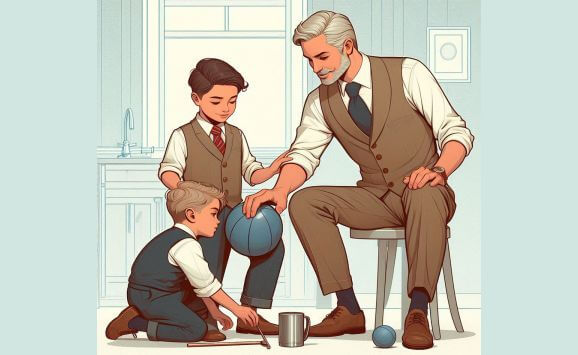Last updated on February 4th, 2025 at 03:51 pm
If you are a bully and unruly, you might raise kids who will grow up to bully people as they watch their father do. Here is how to raise gentlemen as a dad.
Responsible atherhood is responsibility and you as a father should be equal to the task. Raising a gentleman is a noble goal for any father, but it requires intentional effort and guidance.
As a dad, you have the unique opportunity to shape your son’s character, imbue values, and help him navigate the canyons of life, growing into a respectable, kind, and well-mannered young man.
By focusing on key areas such as etiquette and manners, empathy, and personal responsibility, you can hand your son the tools he needs to become a fearless, true gentleman in today’s world.
You might want to pin the image below.

The Voice of My Gentleman Dad Still Echoes in My Ears
In my childhood, my dad’s respect and patience taught me invaluable lessons.
I remember how people eulogized him for helping them in one bad situation or another, especially, settling disputes.
He always emphasized the importance of turning good manners into powerful tools, like saying “please” and “thank you,” and treating everyone with kindness.
His actions, from practicing patience in stressful situations to demonstrating courteous behavior, shaped me into a gentleman.
His consistent example of respect and responsibility provided the foundation I needed to grow into a thoughtful and well-mannered man.
Related: Becoming a Single Father
Teach Your Boys that Being All Tough is not Being a Man
Teach boys that true manhood is about empathy, respect, and emotional intelligence, not just being tough.
Encourage them to express feelings, show vulnerability, and be kind. Real strength comes from supporting others, staying calm under pressure, and making ethical choices.
Focus on compassion and responsibility, helping boys grow into respectful, well-rounded men.
How to Raise Gentlemen

A father who wants to raise responsible men as sons should have these traits imbued in their young boys as whatever they learn subconsciously in childhood will stand a better chance to remain with them,
This guide is divided into four:
- Modeling respectful behavior
- Teaching the importance of manners
- Encourage empathy and compassion
- Promote responsibility and independence
Model Respectful Behavior
Raising a gentleman starts with dads modeling respectful behavior in their daily lives for their kids to pick up.
Children learn more by observing and imitating, so they will subconsciously adopt these traits when they see them practiced.
Respectful Communication
Respectful communication stands at the forefront of how to raise gentlemen as a father.
By engaging in conversations politely and with consideration, dads can teach their sons the importance of listening to others and valuing differing perspectives.
This empathetic approach not only encourages mutual respect in familial relationships but also extends to interactions outside the home.
Demonstrating Patience
Showing patience is another important trait in the toolkit of a gentleman.
Fathers who demonstrate patience in various situations, whether it’s waiting in a long line or handling a stressful work scenario, provide a living example of how to remain composed and thoughtful under pressure.
This kind of behavior helps sons understand that rushing to anger or frustration is neither effective nor acceptable, thereby cultivating a calm and respectful demeanor.
Kindness in Daily Interactions
Treating everyone with kindness is equally essential. Whether it’s a simple daily interaction with neighbors, service workers, or strangers, acts of kindness and respect have a profound impact on young observers.
Dads who consistently express gratitude, help others and offer compliments contribute to their sons’ understanding of what it means to be genuinely compassionate and courteous.
Teach the Importance of Manners

Manners and etiquette have so much to do in raising a gentleman. Teaching your kids, the importance of good manners will help them grow into gentlemen of high value.
You should teach your boys the importance of using ‘please’ and ‘thank you,’ as these simple courtesies encourage respectful interactions.
Your boys can’t imbibe these traits when you as a father is a bully or mannerless.
You as a dad should play the important role of consistently sampling these behaviors and reinforcing their importance through everyday conversations.
By praising and rewarding positive behavior, fathers can encourage their sons to adopt these polite expressions as natural parts of their communication.
Table Manners
Understanding table manners is essential for boys to become gentlemen.
Teach your boys the basics of table manners like chewing with mouths closed, using utensils properly, and waiting for others to be served to prepare them for dining situations.
Fathers can create practice opportunities during family dinners or outings, gently correcting mistakes and rewarding good behavior, making the learning process both educational and enjoyable.
Manners in the Digital Age
As technology becomes more integrated into daily life, it’s needed to teach your boys appropriate digital etiquette.
Gentlemen should learn to put away devices during conversations and meals to show respect.
As a dad, you can set boundaries, like no devices at the dinner table, and lead by example to promote a balanced relationship with technology.
Respect in All Relationships
Good manners extend beyond formal settings and are a way to show consideration in all relationships. Whether interacting with family, friends, or strangers, demonstrating respect, kindness, and empathy are the hallmarks of a true gentleman.
By integrating these principles into daily life and consistently reinforcing them, you can help your sons develop a genuine respect for others that will serve them well throughout their lives.
Encourage Empathy and Compassion

Empathy and compassion are essential traits of a gentleman, enabling you to understand and relate to the feelings of others.
These qualities encourage healthier interpersonal relationships and contribute to a more compassionate society.
As a role model to your son, you are responsible for your son’s development of empathy. Here are tips to guide you:
Engaging in Meaningful Activities
By participating in meaningful activities and initiating thoughtful conversations, dads can help their boys develop emotional intelligence and respond to the needs of others with kindness and understanding.
Role-Playing Exercises
Role-playing exercises are an effective way to teach empathy. Encouraging your son to put himself in the shoes of others helps him understand what it feels like to be like others in real time.
Practicing scenarios like resolving conflicts or comforting a friend builds his empathetic capacity.
As a father, encourage this learning by sharing personal stories that highlight the importance of empathy, compassion, and the benefits.
Community Service
Participating in community service as a family is a powerful way to subconsciously imbue compassion in your son.
Activities like volunteering at shelters, organizing clean-ups, or visiting nursing homes instill a sense of responsibility and care for others.
These shared experiences encourage meaningful discussions about the importance of giving back and the positive impact of compassionate actions on people and communities.
Open Conversations About Emotions
Encouraging open conversations about emotions is essential. Help your son express and validate his feelings, creating a safe space for emotional exploration.
This teaches vulnerability and equips him with the language to articulate emotions, building his emotional intelligence and ability to empathize with others.
Promote Responsibility and Independence
Teaching responsibility and encouraging independence are central for raising a true gentleman.
Fathers play a key role by assigning age-appropriate chores and tasks to their sons.
These chores, from basic household duties to more complex assignments, serve as essential exercises in developing a sense of responsibility.
Let’s take a closer shot:
Assigning Age-Appropriate Chores
When children are given tasks, such as making their bed, taking out the trash, or helping with meal preparation, they learn to take ownership of their duties. This is a critical step in developing a responsible mindset which is one of the traits of a true gentleman.
Providing Guidance
Guidance is important in raising gentlemen. When assigning chores, you as a father should provide clear instructions and demonstrate expected outcomes to ensure your boys understand the importance of responsibility and how to handle tasks correctly.
For example, showing the proper method for washing a car or organizing a bookshelf helps sons grasp the importance of their contributions and the value of completing tasks diligently.
Importance of Praise and Positive Reinforcement
Praise and positive reinforcement are crucial in encouraging responsibility and independence.
When you as a father acknowledge efforts and celebrate achievements, it boosts confidence and motivates taking on new responsibilities.
Simple words of encouragement like “Well done” or “I’m proud of you” make a significant impact.
This positive feedback loop builds self-esteem and instills a sense of pride and accountability, reinforcing these critical qualities.
Final Word from Gentsways
Learning how to raise gentlemen is the responsibility of a father, and you do not have any excuse to raise unruly, irresponsible sons.
Raising a gentleman requires deliberate effort and exemplary behavior from fathers.
By modeling respect, practicing patience, and emphasizing kindness, dads can guide their sons to develop strong manners and empathy.
Teaching the value of responsibility and leading by example in everyday interactions prepares boys to grow into well-mannered, compassionate men.
Through these intentional practices, fathers can nurture their sons into respectful, kind individuals ready to navigate life with grace and integrity.
References:
- https://www.familylife.com/articles/topics/parenting/essentials/raising-boys/how-to-raise-a-boy-to-be-a-man/
- https://citydadsgroup.com/raise-a-gentleman-we-hope-in-5-easy-steps/
Pyo Merez is a men’s lifestyle enthusiast and writer about the gentleman’s place and impact on society. Raised by a distinguished gentleman dad, he offers unique insights into how the mind of a gentleman works and how societal norms shape gentlemen’s identity and vice versa.
Through his insightful articles, Pyo taps into the depths of gentleman culture to provide perspectives on etiquette and manners in modern society.

